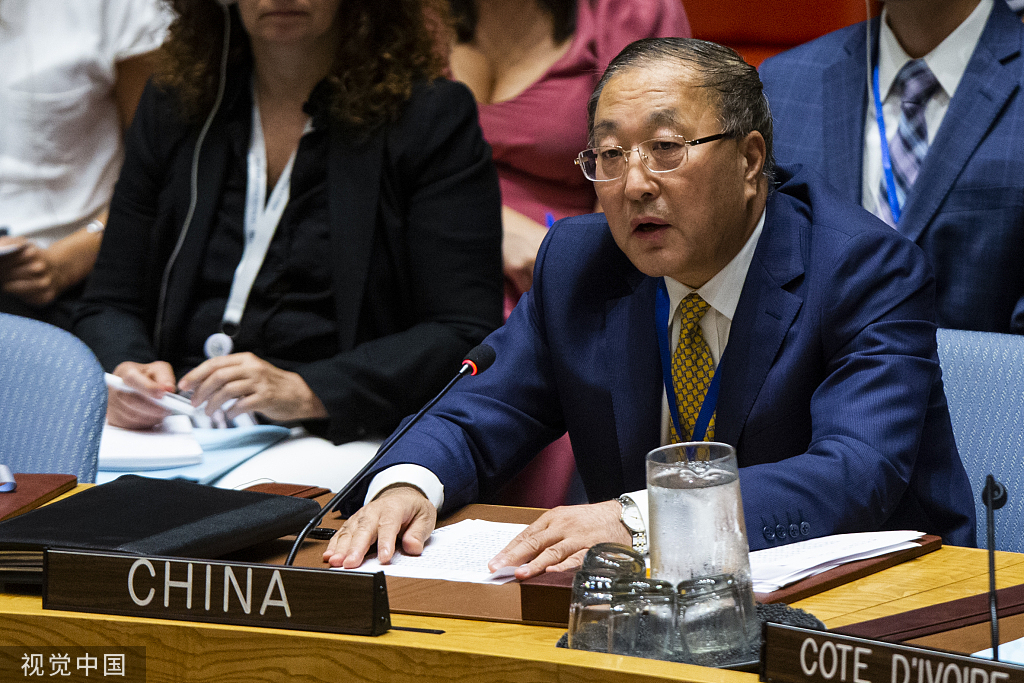
China's envoy to the United Nations reiterated his country's position Thursday on the Intermediate-Range Nuclear Forces (INF) Treaty, saying it is "unacceptable to use China as an excuse for leaving the treaty, and China rejects the baseless accusation by the United States".
Zhang Jun, China's permanent representative to the UN, said that prior to its official withdrawal from the INF treaty, the US already announced its plan to accelerate the development and deployment of intermediate-range missiles. Lately, it conducted a test launch of a land-based cruise missile.
"China strongly urges the relevant country to take a highly responsible attitude, exercise restraint and earnestly preserve the existing arms-control regime in an effort to safeguard global strategic balance and stability and international and regional peace and security," Zhang said at an emergency meeting of the Security Council on Thursday at UN headquarters in New York.
The meeting was convened at the request of Russia with the support of China, citing the effects of the US cruise missile test on Sunday, according to the Security Council report.
The US Department of Defense confirmed on Monday that it had conducted a flight test of a ground-launched cruise missile that hit its intended target after traveling for more than 500 kilometers (311 miles).
This marks the first time the US has conducted an intermediate-range cruise missile test after it formally withdrew from the INF Treaty on Aug 2, according to Xinhua.
Deputy Russian Ambassador to the UN Dmitry Polyanskiy told the meeting that Washington's testing of a ground-launched missile showed "America is ready for an arms race".
Polyanskiy said that Russia was ready for "serious dialogue" over arms control, accusing European countries of tolerating the US' actions.
Zhang said that the INF treaty is important to arms control and disarmament. The unilateral withdrawal of the US from the treaty led to "the demise of the treaty", which will have a "far-reaching negative impact on global strategic balance and stability, regional security in Europe and Asia, as well as the international arms control regime".
In response to the US' criticism of China's development of intermediate-range missiles, Zhang emphasized that US withdrawal from the INF is another act of unilateralism and avoidance of international obligations by the US.
"It is aimed at relieving restrictions and seeking absolute military advantage," he said.
He stressed that China "unswervingly" pursues a national defense policy that is defensive in nature.
"China's nuclear strategy for self-defense is completely transparent, and its nuclear policy is highly responsible," he said. "China's nuclear arsenal is extremely limited in scale and poses no threat to international peace and security."
He told the meeting that for decades, China has actively participated in arms-control consultations and negotiations under multilateral mechanisms and frameworks, including those of the United Nations and the Conference on Disarmament.
"China opposes an arms race and works to safeguard global strategic balance and stability. Moving forward, China will continue to firmly uphold multilateralism and actively participate in multilateral arms control processes to contribute to the maintenance of international peace and security," he said.
Regarding the US claim that China should join the United States and Russia in arms- control negotiations, Zhang stressed that for any such negotiations, it is imperative to fully consider the overall military capabilities of countries and follow the principle of "undiminished security for all", a basic principle of international arms control.













